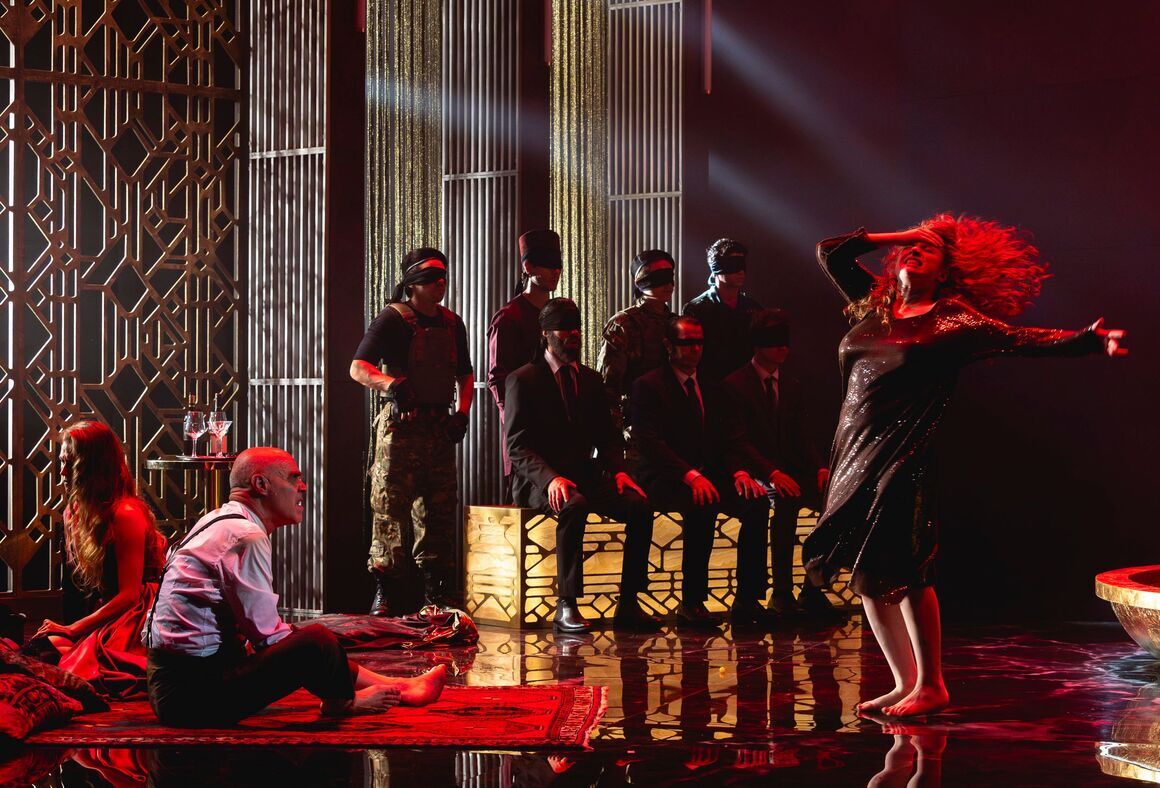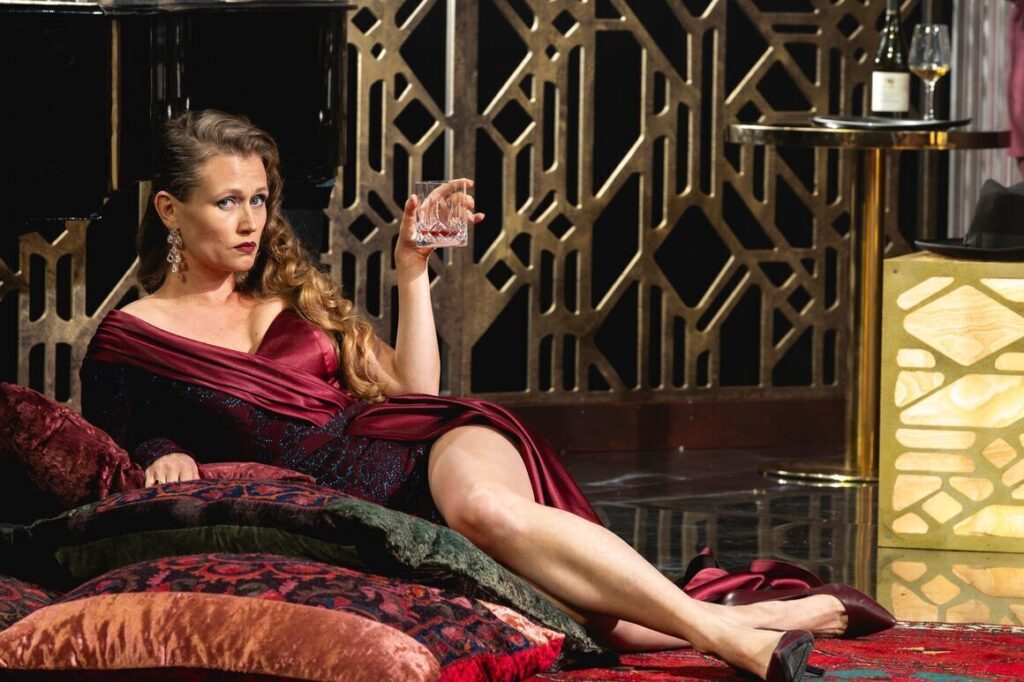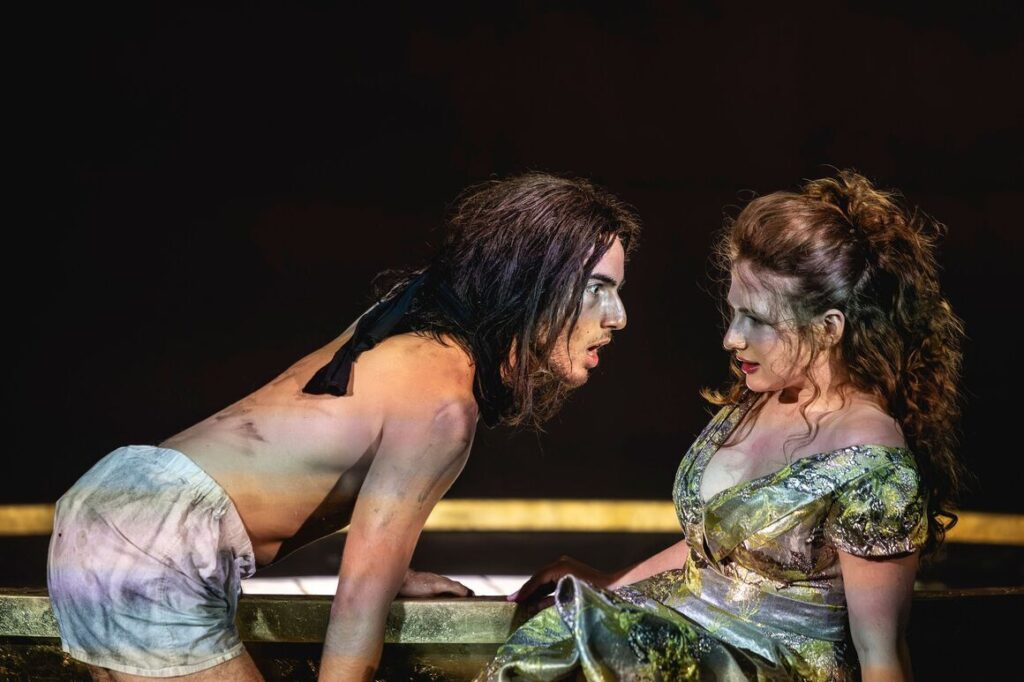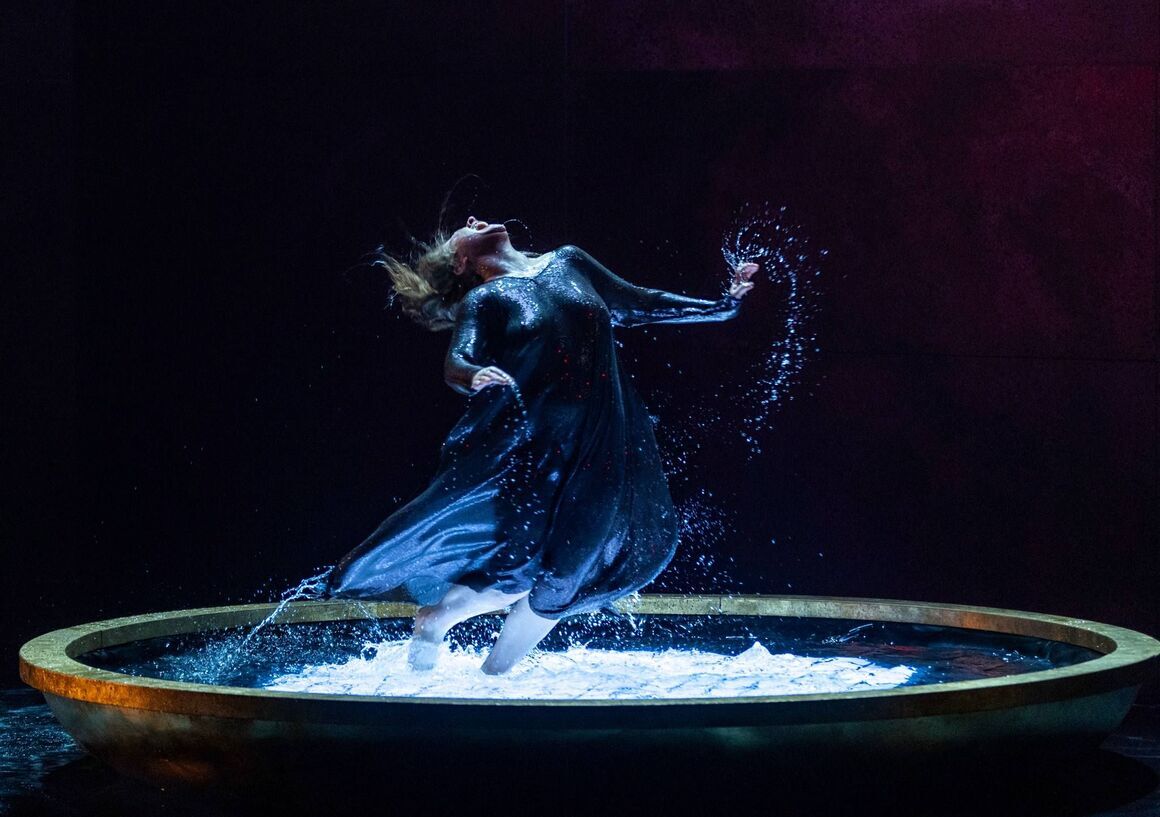Review by Simon Jenner, October 10 2025
★★★
The only way is extreme. Strange to say it takes nuance, and nudity must go naked with some truth. Oscar Wilde’s Salomé has never entirely settled, never quite lost its aura of decadent ritual. That’s largely because this one-act piece, written in French in 1891 and translated by Alfred Douglas, seems more a delicate sacrilege of Racine than it prefigures the four comedies Wilde was about to write. There’s moments when its overblown metaphors prefigure one-liners, even moments of natural speech. They can’t be forced and Salomé feasts on itself alone. Gesher Theater’s production of Wilde’s Salomé plays at the Haymarket till October 11 directed by Maxim Didenko.
After Richard Strauss hijacked it as his first operatic masterpiece in 1905, Salomé which enjoyed brief European fame, has never quite recovered. Except when it meets Steven Berkoff whose 1988 production measures everything since. Still, it’s the only purely symbolist drama that gets revived. Certainly it’s one that thrives on the oppressive, paradoxically enflamed by licence. Here even warnings about photography are delivered with a touch of menace by a cast member. Perhaps that’s performative, though matches the security checks outside where bottles of water must be drunk or discarded, and we go through layers of security including metal detection and brusque demands as if stripping seven veils ourselves. Beyond that, there’s protests, which apparently made it inside on press night. Inside beyond usual state thanks, there’s four cast-links to the IDF Theatre or IDF. I wouldn’t have chosen to be here.
However, Jaffa-based and with strong Russian foundations, Gesher is known in happier times for building bridges with the Arab community. Timing, never easy, has proved atrocious here. Having declared the elephant, what about the room?

The Company. Photo Credit: Tristram Kenton

This hinges on the use of language throughout and a few key roles. Difficult language is delivered awkwardly (sometimes badly) by secondary characters, something only heightened by the fluency of the eponymous lead who sounds like a Londoner, which she isn’t. Gesher regular Neta Roth is both dismissive and cruelly oblivious as Salomé, recalling how closely she parallels the princess in Wilde’s story The Birthday of the Infanta (also published in 1891). There’s more Infanta than seducer in Roth’s portrayal and that’s valid, though chemistry between her and most of the cast is somewhere at minus 273. That’s saved briefly with Salomé’s mother Herodias (a striking and assured Lena Frafield, full of disdain). Her embrace discharges the lightning of adolescence teetering on womanhood, the desire for love and approval not from men, but her mother. With one partial exception, Jokanaan.
Doron Tavori’s Herod is miced up so he can speak softly like a dictator who only need whisper his desires. Tavori certainly looks the part of a king whose moral diseases are legion, and exudes it. The mic though delivers his auditory world across the more natural one of others, and though this difference centres the character as apart, that’s not how he can be played with more affect, as Berkoff so commandingly proved. Though he emits unease, Tavori’s exchanges with Roth are leaden. It’s not helped by Wilde, and though this plays for 100 minutes I could have happily lost five in their subsequent stand-off.
Galya Solodovnikova’s gorgeous set like a Dubai hotel isn’t the first to essay modern décor and modern dress: Daria Dontzova’s mainly dark creations culminate in much diaphanous lamé for Salomé. No-one could possibly accuse Wilde’s quasi-biblical drama of naturalism, and the rich burgundies and golds centred by a wide shallow gilt bowl for people to slosh in is a recurrent feature of indulgent theatrics seen everywhere; even the diminutive Wanamaker in their 2022 Hamlet. Floors and pillars gleam, luxury pulses. The reveal on Jokanaan’s glass box cell which opens upstage to deep reds and shutters down, is a striking way to get round sightline issues: the cistern he’s nominally confined to in the cellarage. There Jokanaan (Shir Sayag) stands near-naked against that red in baroque chiaroscuro. It’s pure Caravaggio, who painted the story’s denouement. Caravaggio would have recognised (and probably celebrated) the performative cruelty in this cell that normalises torture and incarceration in a chilling way. It’s too contemporary to miss. Here the luxury of violence meets the violence of luxury. If there’s a critique of this world, it lies there.
The set’s lit with occasional reds by Gleb Filshtinsky with often striking vocal music by Louis Lebée and of course movement director Polina Dreyden has much to do with stillness and frenzy. She succeeds too, as Salomé’s dance is a highlight, as it has to be. Sayag leads the cast in singing, which begins with the Syrian officer (Itamar Peres) who starts the singing as if we’re in a different play than the one which unfolds. Strauss has beaten this production to that by nearly 120 years and though it’s a text florid enough to invite setting, the way to crack this is to take Wilde’s music seriously.
Lena Fraifeld. Photo Credit: Tristram Kenton

Sayag is an impressive counter-tenor, though considering his role as mute defiance this invocation of holy theatre is again an indulgence. Nevertheless Lebée’s music can work somewhere, if everything else does. Sayag has little space for shading, his role all flinch and flight from Salomé’s overtly sexual advances. This falls to the main stage when Jokanaan slithers backwards all round, comically so. A mutual intoning of each other’s eyes turns absurdly funny since he’s blindfolded. Nevertheless Sayag speaks with venomous clarity, a foil to Roth’s equally biting ripostes and come-ons. Later, Alexandra Sacharov’s model of Sayag’s head is unnervingly fine.
Roth herself proves a fine responder to Dreyden’s choreographic challenge, and in her stillness and capacity to switch on charisma and suddenly shut off and fall to the side as others take centre-stage, she’s a strong performer. It’s her strength as performer rather than ideal casting for Salomé that allows her to blast through the production. Sensuality is rightly highlighted in production values: it’s the world Wilde invokes. There needs to be more from actors too.
Smaller parts are confined. Herodias’ Page Gary Nofin enjoys a little grace as the Syrian officer’s friend, and delivers with a touch of warmth. Cappadocian (an effective Yanal Yuvai) begins venomous accusations against Jokanaan though Wilde gives him little time. Ori Yaniv’s Roman Ambassador has few chances to deliver angsty gravitas, and Nubian Bartender Nikita Oleinikov even less. Itay Tarhanov’s Soldier and Agam Ozalvo’s menacing Executioner are mostly silent, and one imagines Wilde, after his comedies and had he been able to mount this work, might well have pared the cast down. Little care and differentiation is given to their roles. Only Nir Knaan’s Pianist, an added role, owns his space with riffs on the piano facing donstage.
Cultural reappropriation has its virtues, and this play has too long basked in another European bit of 1890s exoticism. Nevertheless the largely western-based creatives don’t break new ground in this 2024 production. Except in pelting us with luxury gone rancid, and here there’s a twitch of disquiet with wallowing in gorgeous palaces. The passion though, the intensity of repugnance and desire that should thrill between Roth, Sayag and Tavori, even in this Wilde-crabbed ritual, is often lacking. The seethe and thrust back that should act like magnets reversing, can’t be emulated by Salomé’s tantrums and the men’s different kinds of sulk.
Only Fraifeld enjoys an all-round response to her icy disdain and maternal affection. Roth, Sayag and Fraifeld would be well worth encountering in a happier production and happier world. Sheer spectacle powers this through, with a twist of unease for having seen it.
Gesher has produced some extraordinary work, not least their mounting of Babel’s Odessa Stories. Their Salomé, sadly, seems wrong for their strengths now, and certainly at the wrong time.
Artistic Producer Ekaterina Kashyntseva, Speech Consultant Yonny Lucas, Assistant Director Dasha Sahamina
Stage Manager Maxim Rozenberg, Props Alexandra Sacharov, Sound Michael Vaisburd, Lighting Alexey Filimovo, Fedor Haitov, Stagehands Ilya Levintant, Dmitry Raizman, Andrey Kulish, Maxim Rozenberg.
Shir Sayag and Neta Roth. Photo Credit: Tristram Kenton



